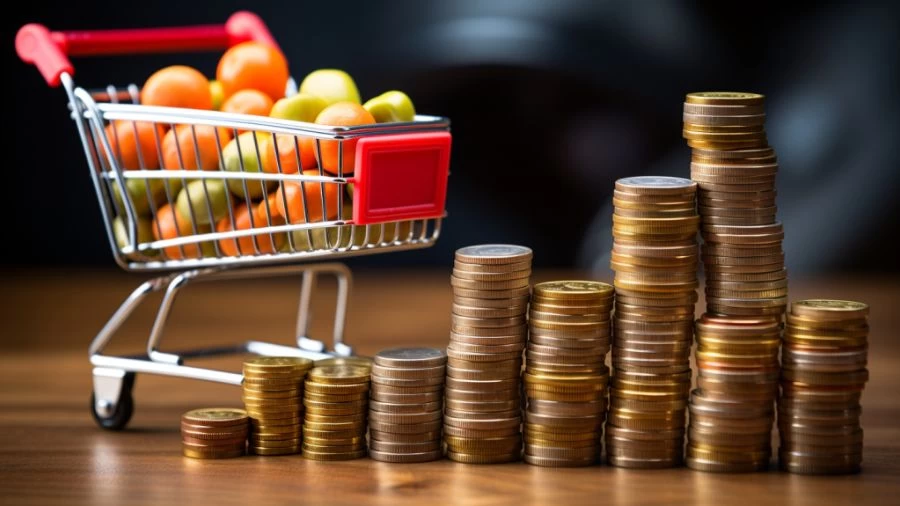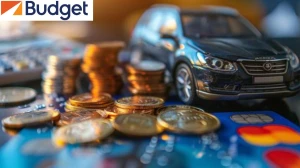
How to Protect Yourself From Inflation?
Inflation might feel like a stealthy price increase, your favorite products seem the same, but you're actually getting less for your money and it happens because the value of your money decreases over time, so your dollar doesn't go as far as it used to.
Published Sep 29, 2023 | Updated Sep 29, 2023 | 📖 11 min read
On This Page
What is Inflation?
Inflation is like when the prices of things we buy go up over time. This means that the money we have can buy less than it used to. For example, if a candy bar used to cost $1, but now it costs $1.10, that's a sign of inflation. It happens because the prices of many things are going up.
Inflation can be good or bad depending on how you look at it. Some people, like those who own houses or things that can go up in value, might be happy with a little bit of inflation because it can make their stuff worth more. But for others, especially if their income doesn't go up as fast as prices, inflation can make it harder to afford the things they need. So, it's like a seesaw – it can go up or down, and it affects different people in different ways.
How to Protect Yourself From Inflation?
Inflation, like a sneaky price increase, can make your favorite products seem like they cost the same, but you're actually getting less of them. This is called "shrinkflation" or "downsizing." It happens because the value of your money goes down over time, so your dollar buys less than it used to.
Inflation can feel a lot like when prices go up because of high demand or low supply, like when egg prices suddenly rise. But it's a bit different.
Experts say a bit of inflation, around 2%, is okay and even healthy in the long run. It's like a small nudge to keep the economy going. But when prices keep going up year after year, it can cause trouble.
In the 1970s, we had really high inflation, and the government had to take strong steps, like raising interest rates a lot, to bring it down. Recently, inflation in the US went up quite a bit, but it seems like the government's efforts, like raising interest rates again, are slowly bringing it down. They're trying to find a balance between having just enough inflation and not causing an economic downturn. To protect yourself from inflation, here's what you can do:
Exploring Inflation-Resistant Diversification Options
When dealing with rising inflation, it's a good idea to think about adding some inflation-resistant investments to your portfolio. If you already have a diversified mix of stocks and bonds, you may have some level of protection because historically, such portfolios have grown even when inflation is high.
Some steps have been taken to provide extra protection against inflation. These steps include investments that have typically done well when inflation is on the rise. These include a mix of different commodities like energy, metals used in industry, precious metals like gold, and agricultural products. They've also added international stocks to the mix.
In the bond market, there's an emphasis on high-yield bonds. These bonds offer higher returns, but they also come with more risk compared to investment-grade bonds. However, their higher yields can help them handle interest rate increases that might happen when inflation goes up.
Additionally, favoring short-term bonds during inflationary periods is a strategy because they tend to be less affected by market swings. But they're also keeping some exposure to long-term bonds because they can provide stability in diversified portfolios, especially when the stock market is volatile.
So, to protect your investments from inflation, consider adding a mix of these inflation-resistant options to your portfolio, while keeping an eye on the balance between risk and potential returns.
Scrutinizing Your Budget: A Necessity
Taking a closer look at your budget is a smart move, especially when prices are on the rise. With inflation, you may find that things you don't necessarily have to buy are getting more expensive. One suggestion is to understand what's causing prices to go up and adjust your spending accordingly.
For instance, if you notice that certain items like used cars, furniture, or groceries like pork and bacon have become a lot pricier, you might want to postpone buying them for a while. Instead, focus on purchasing the things you genuinely need and try to reduce your spending on non-essential items. This way, you can better manage the impact of inflation on your finances.
Avoiding Overreliance on Cash Holdings
When things in the financial world get shaky and uncertain, many people think about moving their money into cash because it feels safe. Cash seems stable, and the numbers in your account don't change much. But here's the thing: when inflation is happening, holding a lot of cash can actually be a bad idea.
That's because as time goes by, the value of your cash goes down. The money you had in your account won't buy as much as it used to. So, even though the number stays the same, what it can buy gets less and less.
Besides that, if you take your money out of investments and keep it in cash for too long, it can hurt your long-term financial growth. For example, if you miss out on the 10 best days in the stock market over a few decades, you could end up with much less money – up to 55% less, historically.
Reevaluating Your Emergency Savings
It's a good idea to take a fresh look at your emergency savings, especially with prices going up due to inflation. While it might not be smart to keep a lot of your money in cash, it's still important to be prepared for unexpected expenses that might come up.
Because things are getting more expensive, you might want to add more money to your emergency fund. This way, you make sure you have enough to cover the costs of unexpected bills or expenses if they happen.
Usually, experts recommend having enough money in your emergency fund to pay for your regular expenses for 3 to 6 months. But to do this, you need to know exactly how much you spend day-to-day. If you haven't figured that out yet, it's a good time to do it. That way, your emergency fund will be ready to help you when you really need it.
Staying Alert to Estate Tax Obligations
It's crucial to stay aware of estate tax responsibilities, especially if you own a valuable home. In some places, home prices have gone up a lot, and depending on where you live, the higher value of your home could push you over the limit for estate or inheritance taxes in your state.
Here's why it matters: your house is considered an asset, even if you don't think about its value every day. When it's time to pass on your estate to your family, the value of your home could lead to a significant tax bill for them.
If you suddenly find yourself at risk of paying more taxes because your home's value has increased, you might want to think about strategies to reduce or "freeze" your estate's tax burden. Some options include using your annual gift exemption or moving your assets into a trust. These moves can help you manage the taxes that your family might have to pay when they inherit your estate.
Minimizing Taxation Impact: A Smart Move
Taxes can really eat into the money you make from your investments, and that's not great for your overall financial picture. So, being smart about how you handle taxes can make a big difference.
Here's a tip: When the stock market goes up and down, you can use a strategy called "tax-loss harvesting." It's a way to lower the taxes you have to pay. Also, it's important to put investments that are not very tax-friendly in the right kinds of accounts that either delay or completely avoid taxes. This can help you reduce the total amount of taxes you owe, which can be a big help when you're trying to counter the effects of inflation.
The Importance of Proactive Financial Planning
Financial planning isn't the same for everyone. It depends on how much money you have and where you are in life. But having a solid financial plan can be comforting, especially when things in the money world seem uncertain.
In the current situation, being too cautious and keeping most of your money in short-term investments like cash and CDs might not be the best idea. Even though we expect inflation to slow down a bit, it might take some time. And while there are lots of uncertainties for investors, playing it too safe could mean your money doesn't grow enough to keep up with rising prices.
So, having a financial plan that fits your situation is important. It can help you make the right choices for your money and give you peace of mind, even in uncertain times.
MarketsHost is your gateway to the dynamic world of Economy, offering a wealth of information on finance, loans, and insurance.
What are the Causes of Inflation?
The following situations make money lose its buying power, and that's what drives inflation. There are also different types of inflation, like when prices go up because people want to buy more things (demand-pull inflation), or when prices go up because it costs more to make products (cost-push inflation), or even when prices go up just because people expect them to (built-in inflation). Inflation happens when there's more money circulating in the economy, and this can occur in a few ways:
Printing More Money: When a country's government prints and gives away more money to its citizens, there's more money in people's hands. This can lead to inflation because there's more money to spend, and people start bidding up the prices of things.
Reducing Currency Value: Sometimes, governments can reduce the value of their money. This means that the money you have can't buy as much as it used to. When this happens, it takes more money to buy the same things, and that's a cause of inflation.
Creating Money through Banks: Another way is when the government creates new money by buying government bonds from banks. This adds more money into the banking system, and it can end up being used for loans and investments. When there's more money available for borrowing and spending, prices can go up.
How to Calculate Inflation?
Calculating inflation is a way to understand how the purchasing power of your money changes over time. It helps you figure out how much more you need to spend today to buy the same things you could buy with a certain amount of money in the past. The formula for calculating inflation is quite straightforward:
Percent Inflation Rate = (Final CPI Index Value ÷ Initial CPI Value) x 100
Here's how it works
Find the CPI (Consumer Price Index) values for two specific months or years you want to compare. You can usually find this data from reliable sources or financial websites.
Plug these CPI values into the formula. Let's say you're interested in how prices have changed between January 2010 and January 2022. The CPI for January 2010 was 220 (initial CPI value), and for January 2022, it was 270 (final CPI value).
Calculate the percent inflation rate using the formula
Percent Inflation Rate = (270 ÷ 220) x 100 = (1.2273) x 100 = 122.73%
This means that prices have increased by 122.73% between January 2010 and January 2022.
To understand the impact of this inflation rate, you can apply it to a specific amount of money. For instance, if you had $5,000 in January 2010, you can calculate its equivalent purchasing power in January 2022:
Change in Dollar Value = 1.2273 x $5,000 = $6,136.50
So, $5,000 in January 2010 would have the same purchasing power as $6,136.50 in January 2022 due to the effects of inflation. This means that you would need $6,136.50 in 2022 to buy the same things that $5,000 could buy in 2010.
What Are the Effects of Inflation?
Inflation is like a hidden force that quietly shapes the economy and impacts our everyday lives. It's the gradual increase in the prices of goods and services over time. But its effects go far beyond just higher prices at the grocery store. Inflation has various effects on the economy:
Exporters vs. Importers: When a country's currency loses value due to inflation, it can help exporters because their products become cheaper for foreign buyers. However, it can hurt importers because foreign-made goods become more expensive.
Encouraging Spending: Inflation can make people want to spend money faster because they're worried that prices will keep going up. So, it can boost spending on goods.
Savings Erosion: If you have savings, inflation can slowly reduce the real value of your money. This means that over time, your savings may not be able to buy as much as they used to. It can make it harder for people to save or invest for the future.
How to Protect Yourself From Inflation - FAQs
1. What is inflation?
Inflation is the gradual increase in the prices of goods and services over time.
2. How does inflation affect my purchasing power?
Inflation erodes the purchasing power of your money, making it buy less than it used to.
3. What can I do to protect myself from inflation?
Invest in assets that tend to rise in value with inflation, like stocks or real estate.
4. Is having cash savings a good strategy to combat inflation?
Keeping too much cash may not be wise as it can lose value due to inflation.
5. Should I adjust my budget due to inflation?
Yes, reevaluate your budget and focus on essential expenses to cope with rising prices.




